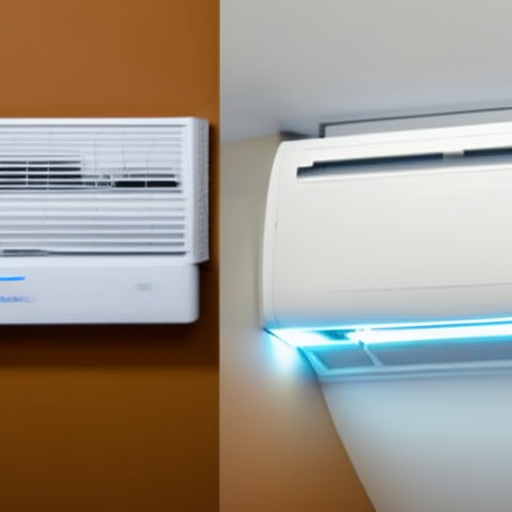As the temperatures climb and the hot summer days arrive, so does the thought of air conditioning. But do you know the difference between a mini split and ductless air conditioning? If you don’t, this article is dedicated to explaining the key differences between the two.
Understanding Mini-Split Systems
Mini-split systems are a type of air conditioning unit that does not require ductwork to distribute cool air. Instead, mini-split units are composed of an outdoor compressor and an indoor air-handling unit, which is mounted on the wall or ceiling of a room. This makes them ideal for homes or rooms that cannot accommodate traditional ductwork systems.
One of the biggest advantages of mini-split systems is their flexibility. Since they do not require ductwork, they can be easily installed in any room without the need for major renovations. They are also incredibly quiet compared to traditional air conditioning units since the compressor is located outside of the house. Plus, they allow for precise temperature control, meaning you can keep different rooms at different temperatures without wasting energy. Whether you want to keep your bedroom cool and comfortable throughout the night or keep your living room cozy during the day, mini-split systems can meet your needs.
Advantages of Ductless Heating and Air Conditioning
- Ductless systems are energy efficient, saving you money on energy bills.
- Delivers hot/cold air directly into individual rooms
- Creates a healthier living environment, free from dust and allergens.
- Customizable temperature for each room
- Quiet operation
- Can reduce operating costs
Disadvantages of Ductless Systems
One disadvantage of ductless systems is the initial cost. While the costs of ductless and central HVAC systems are comparable, the upfront cost of installing ductless units can be higher than central systems. This is because each indoor unit requires an outdoor unit, adding to the total cost of installation. However, the lack of ductwork required for ductless systems can mean lower installation costs for homeowners who do not currently have ductwork in place.
Another disadvantage of ductless systems is their limited cooling and heating capacity. Ductless systems are ideal for heating and cooling individual rooms or zones rather than an entire home. If you have a larger home or need to heat/cool multiple rooms simultaneously, a ductless system may ultimately prove insufficient for your needs. However, for homeowners with smaller homes or who prefer to heat and cool specific zones rather than the entire house, the benefits of ductless systems may outweigh this potential disadvantage.
Comparison of Mini-Split vs Ductless
When it comes to heating and cooling your home, you have many options to choose from. Two popular options are mini-split and ductless systems. While some people use these terms interchangeably, there are actually some key differences between them.
A mini-split system typically consists of an outdoor unit that connects to one or more indoor units via refrigerant lines. These indoor units can be mounted on the wall or ceiling and are controlled by a remote. On the other hand, a ductless system typically consists of only one indoor unit that is mounted on a wall or ceiling. This unit is connected to an outdoor unit via refrigerant lines and is controlled by a separate remote. One advantage of a mini-split system is that you can have multiple indoor units throughout your home, which can be useful if you have a large space or want to control the temperature in different rooms. However, if you only need to heat or cool one room, a ductless system might be a more affordable option.
When it comes to installation, mini-split systems are generally more complex and require professional installation. Ductless systems, on the other hand, are typically easy to install and can be done by a DIYer with some basic tools. Additionally, mini-split systems are often more expensive than ductless systems, both in terms of upfront costs and ongoing energy costs. However, if you need to heat or cool a larger space or multiple rooms, a mini-split system may be more cost-effective and efficient in the long run. Ultimately, the choice between a mini-split and ductless system will depend on your specific needs and budget. At the end of the day, understanding the difference between mini split and ductless systems is key to making a well-informed decision about the type of heater or air conditioner that best meets your needs. The right choice will leave you feeling comfortable and relaxed in your home no matter what the temperature outside!